Exploring the Impact of Smart Cities on Individual Privacy
VerifiedAdded on 2020/04/21
|11
|2613
|289
AI Summary
The emergence of smart cities has introduced innovative solutions to urban challenges such as traffic congestion. These technological advancements leverage IoT devices, AI, and big data analytics to enhance city living by improving infrastructure, public services, and safety measures. However, these innovations also pose significant privacy concerns. The research proposal aims to investigate the impact of smart city technologies on individual privacy, particularly focusing on how real-time traffic management systems collect and use personal data. Through a comprehensive review of existing literature and methodologies such as the probability sampling technique, this study seeks to understand the balance between technological progress in urban environments and the protection of citizen privacy rights. It also explores current trends like the Internet of Things (IoT) for health care, wireless access networks, and big data analytics in holistic healthcare systems, all of which contribute to the smart city ecosystem. The proposal outlines a research framework designed to assess the implications of these technologies on privacy, using qualitative and quantitative methods to gather insights from various stakeholders in smart cities. Ultimately, this study aims to provide recommendations for policymakers and urban planners to ensure that advancements in smart city infrastructure do not compromise individual privacy.
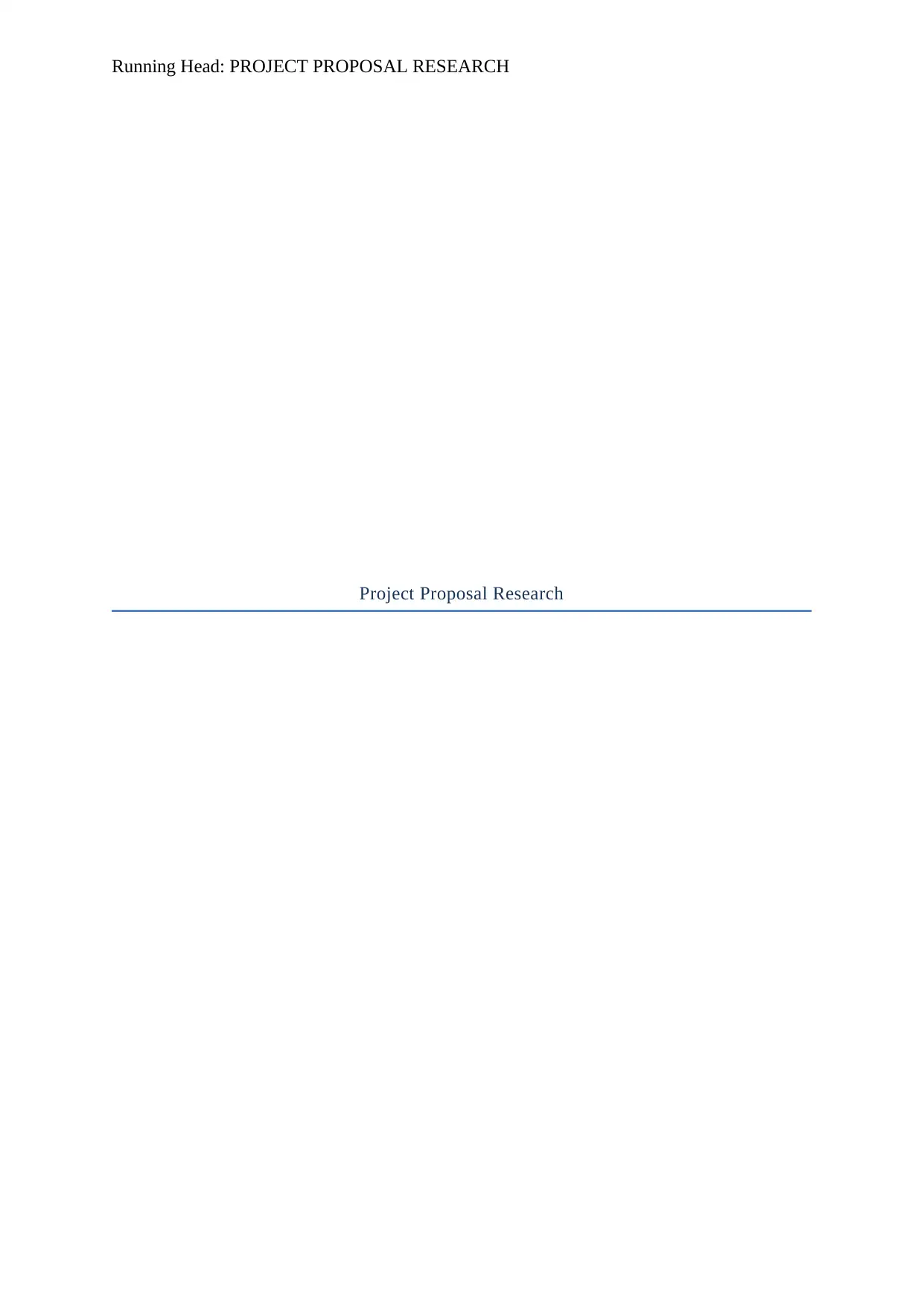
Running Head: PROJECT PROPOSAL RESEARCH
Project Proposal Research
Project Proposal Research
Paraphrase This Document
Need a fresh take? Get an instant paraphrase of this document with our AI Paraphraser
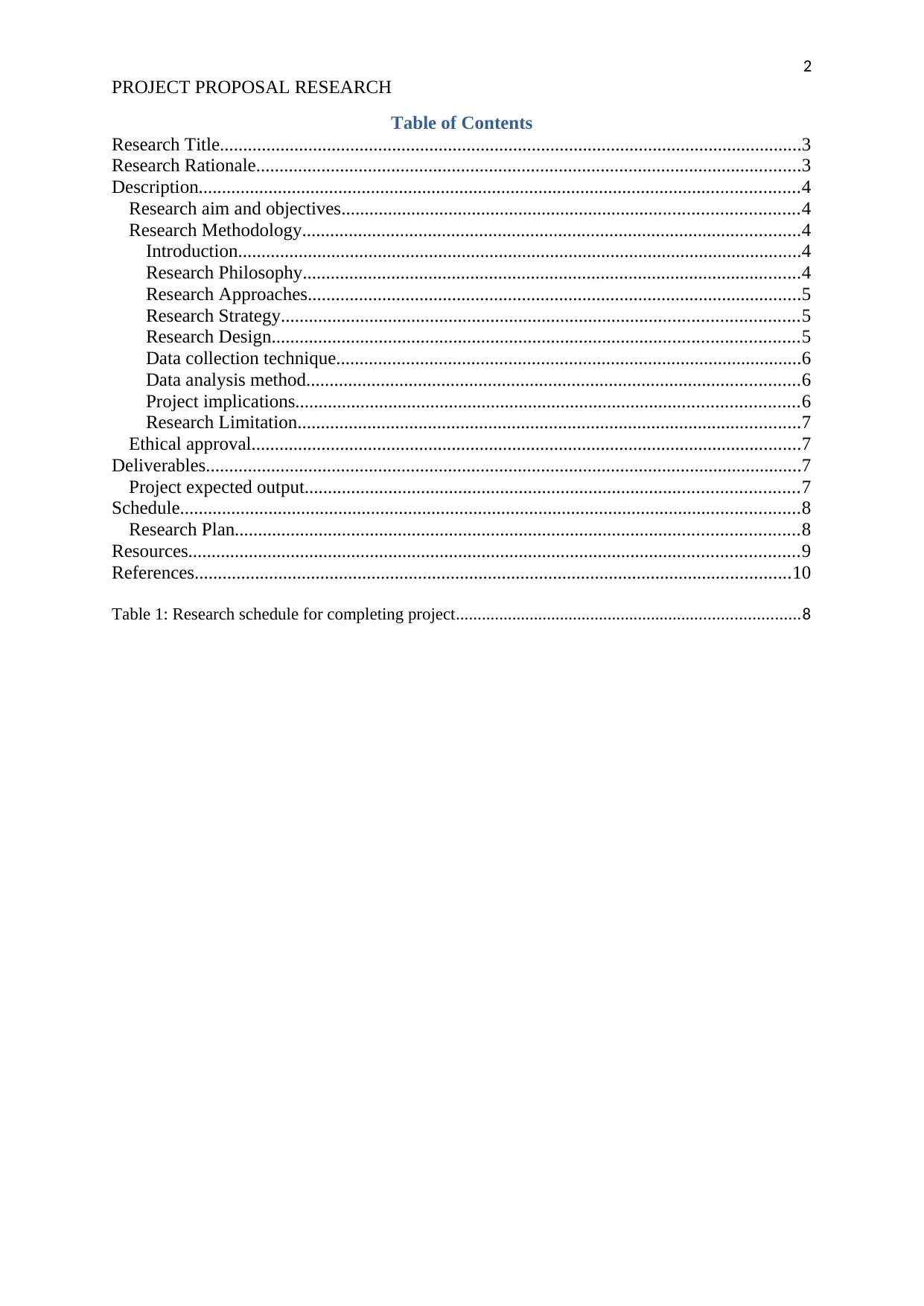
2
PROJECT PROPOSAL RESEARCH
Table of Contents
Research Title.............................................................................................................................3
Research Rationale.....................................................................................................................3
Description.................................................................................................................................4
Research aim and objectives..................................................................................................4
Research Methodology...........................................................................................................4
Introduction.........................................................................................................................4
Research Philosophy...........................................................................................................4
Research Approaches..........................................................................................................5
Research Strategy...............................................................................................................5
Research Design.................................................................................................................5
Data collection technique....................................................................................................6
Data analysis method..........................................................................................................6
Project implications............................................................................................................6
Research Limitation............................................................................................................7
Ethical approval......................................................................................................................7
Deliverables................................................................................................................................7
Project expected output..........................................................................................................7
Schedule.....................................................................................................................................8
Research Plan.........................................................................................................................8
Resources...................................................................................................................................9
References................................................................................................................................10
Table 1: Research schedule for completing project...............................................................................8
PROJECT PROPOSAL RESEARCH
Table of Contents
Research Title.............................................................................................................................3
Research Rationale.....................................................................................................................3
Description.................................................................................................................................4
Research aim and objectives..................................................................................................4
Research Methodology...........................................................................................................4
Introduction.........................................................................................................................4
Research Philosophy...........................................................................................................4
Research Approaches..........................................................................................................5
Research Strategy...............................................................................................................5
Research Design.................................................................................................................5
Data collection technique....................................................................................................6
Data analysis method..........................................................................................................6
Project implications............................................................................................................6
Research Limitation............................................................................................................7
Ethical approval......................................................................................................................7
Deliverables................................................................................................................................7
Project expected output..........................................................................................................7
Schedule.....................................................................................................................................8
Research Plan.........................................................................................................................8
Resources...................................................................................................................................9
References................................................................................................................................10
Table 1: Research schedule for completing project...............................................................................8
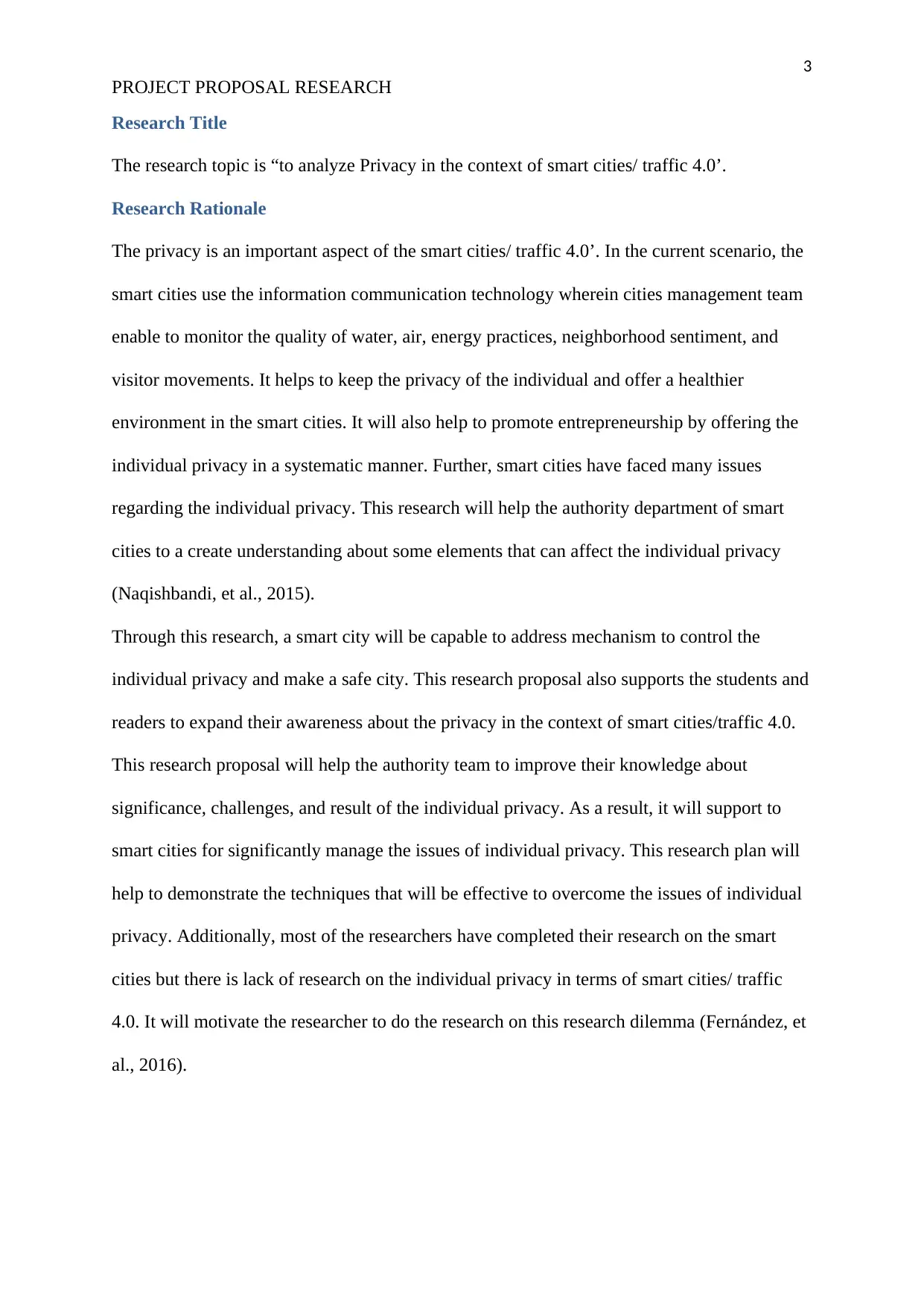
3
PROJECT PROPOSAL RESEARCH
Research Title
The research topic is “to analyze Privacy in the context of smart cities/ traffic 4.0’.
Research Rationale
The privacy is an important aspect of the smart cities/ traffic 4.0’. In the current scenario, the
smart cities use the information communication technology wherein cities management team
enable to monitor the quality of water, air, energy practices, neighborhood sentiment, and
visitor movements. It helps to keep the privacy of the individual and offer a healthier
environment in the smart cities. It will also help to promote entrepreneurship by offering the
individual privacy in a systematic manner. Further, smart cities have faced many issues
regarding the individual privacy. This research will help the authority department of smart
cities to a create understanding about some elements that can affect the individual privacy
(Naqishbandi, et al., 2015).
Through this research, a smart city will be capable to address mechanism to control the
individual privacy and make a safe city. This research proposal also supports the students and
readers to expand their awareness about the privacy in the context of smart cities/traffic 4.0.
This research proposal will help the authority team to improve their knowledge about
significance, challenges, and result of the individual privacy. As a result, it will support to
smart cities for significantly manage the issues of individual privacy. This research plan will
help to demonstrate the techniques that will be effective to overcome the issues of individual
privacy. Additionally, most of the researchers have completed their research on the smart
cities but there is lack of research on the individual privacy in terms of smart cities/ traffic
4.0. It will motivate the researcher to do the research on this research dilemma (Fernández, et
al., 2016).
PROJECT PROPOSAL RESEARCH
Research Title
The research topic is “to analyze Privacy in the context of smart cities/ traffic 4.0’.
Research Rationale
The privacy is an important aspect of the smart cities/ traffic 4.0’. In the current scenario, the
smart cities use the information communication technology wherein cities management team
enable to monitor the quality of water, air, energy practices, neighborhood sentiment, and
visitor movements. It helps to keep the privacy of the individual and offer a healthier
environment in the smart cities. It will also help to promote entrepreneurship by offering the
individual privacy in a systematic manner. Further, smart cities have faced many issues
regarding the individual privacy. This research will help the authority department of smart
cities to a create understanding about some elements that can affect the individual privacy
(Naqishbandi, et al., 2015).
Through this research, a smart city will be capable to address mechanism to control the
individual privacy and make a safe city. This research proposal also supports the students and
readers to expand their awareness about the privacy in the context of smart cities/traffic 4.0.
This research proposal will help the authority team to improve their knowledge about
significance, challenges, and result of the individual privacy. As a result, it will support to
smart cities for significantly manage the issues of individual privacy. This research plan will
help to demonstrate the techniques that will be effective to overcome the issues of individual
privacy. Additionally, most of the researchers have completed their research on the smart
cities but there is lack of research on the individual privacy in terms of smart cities/ traffic
4.0. It will motivate the researcher to do the research on this research dilemma (Fernández, et
al., 2016).
⊘ This is a preview!⊘
Do you want full access?
Subscribe today to unlock all pages.

Trusted by 1+ million students worldwide
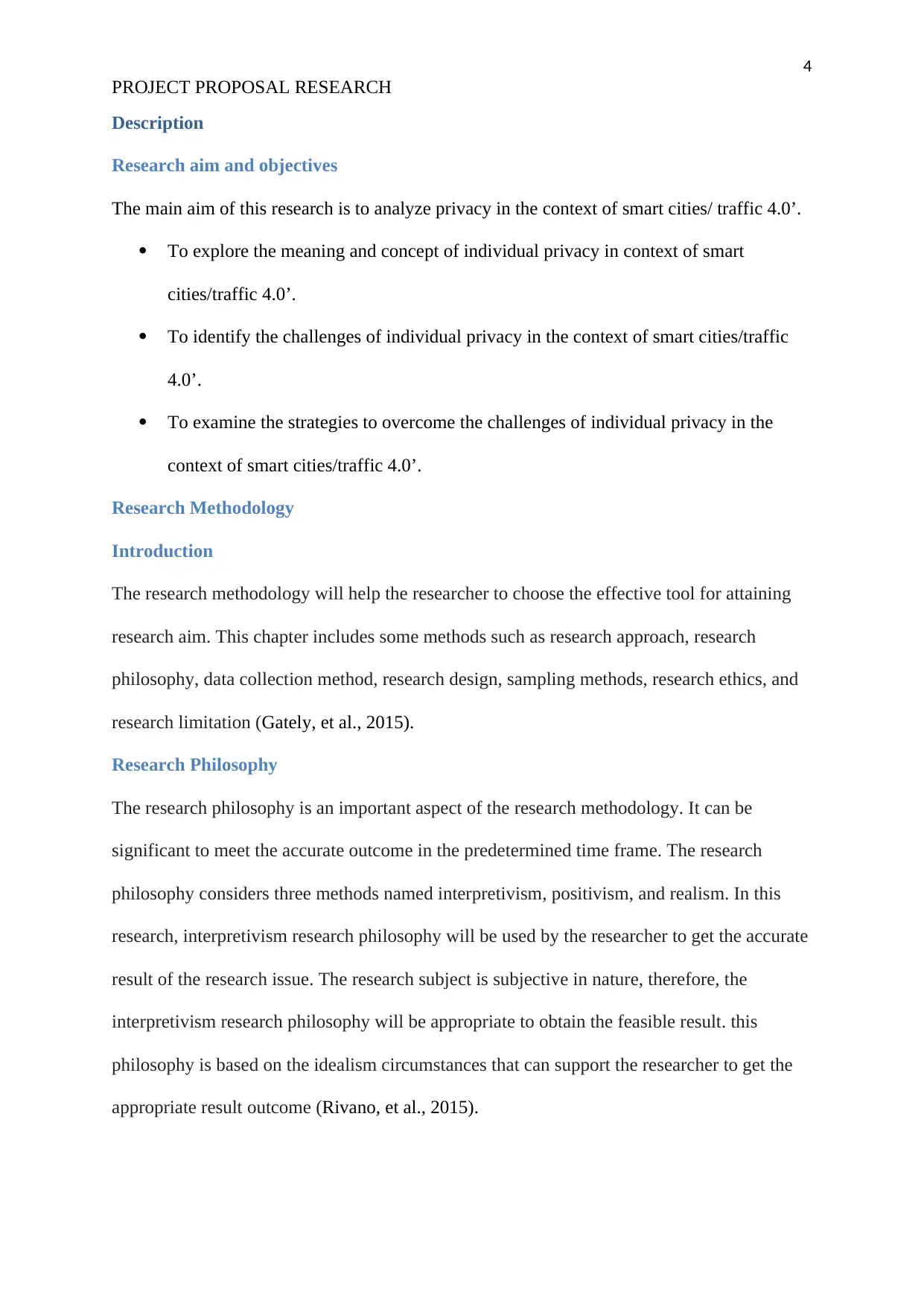
4
PROJECT PROPOSAL RESEARCH
Description
Research aim and objectives
The main aim of this research is to analyze privacy in the context of smart cities/ traffic 4.0’.
To explore the meaning and concept of individual privacy in context of smart
cities/traffic 4.0’.
To identify the challenges of individual privacy in the context of smart cities/traffic
4.0’.
To examine the strategies to overcome the challenges of individual privacy in the
context of smart cities/traffic 4.0’.
Research Methodology
Introduction
The research methodology will help the researcher to choose the effective tool for attaining
research aim. This chapter includes some methods such as research approach, research
philosophy, data collection method, research design, sampling methods, research ethics, and
research limitation (Gately, et al., 2015).
Research Philosophy
The research philosophy is an important aspect of the research methodology. It can be
significant to meet the accurate outcome in the predetermined time frame. The research
philosophy considers three methods named interpretivism, positivism, and realism. In this
research, interpretivism research philosophy will be used by the researcher to get the accurate
result of the research issue. The research subject is subjective in nature, therefore, the
interpretivism research philosophy will be appropriate to obtain the feasible result. this
philosophy is based on the idealism circumstances that can support the researcher to get the
appropriate result outcome (Rivano, et al., 2015).
PROJECT PROPOSAL RESEARCH
Description
Research aim and objectives
The main aim of this research is to analyze privacy in the context of smart cities/ traffic 4.0’.
To explore the meaning and concept of individual privacy in context of smart
cities/traffic 4.0’.
To identify the challenges of individual privacy in the context of smart cities/traffic
4.0’.
To examine the strategies to overcome the challenges of individual privacy in the
context of smart cities/traffic 4.0’.
Research Methodology
Introduction
The research methodology will help the researcher to choose the effective tool for attaining
research aim. This chapter includes some methods such as research approach, research
philosophy, data collection method, research design, sampling methods, research ethics, and
research limitation (Gately, et al., 2015).
Research Philosophy
The research philosophy is an important aspect of the research methodology. It can be
significant to meet the accurate outcome in the predetermined time frame. The research
philosophy considers three methods named interpretivism, positivism, and realism. In this
research, interpretivism research philosophy will be used by the researcher to get the accurate
result of the research issue. The research subject is subjective in nature, therefore, the
interpretivism research philosophy will be appropriate to obtain the feasible result. this
philosophy is based on the idealism circumstances that can support the researcher to get the
appropriate result outcome (Rivano, et al., 2015).
Paraphrase This Document
Need a fresh take? Get an instant paraphrase of this document with our AI Paraphraser
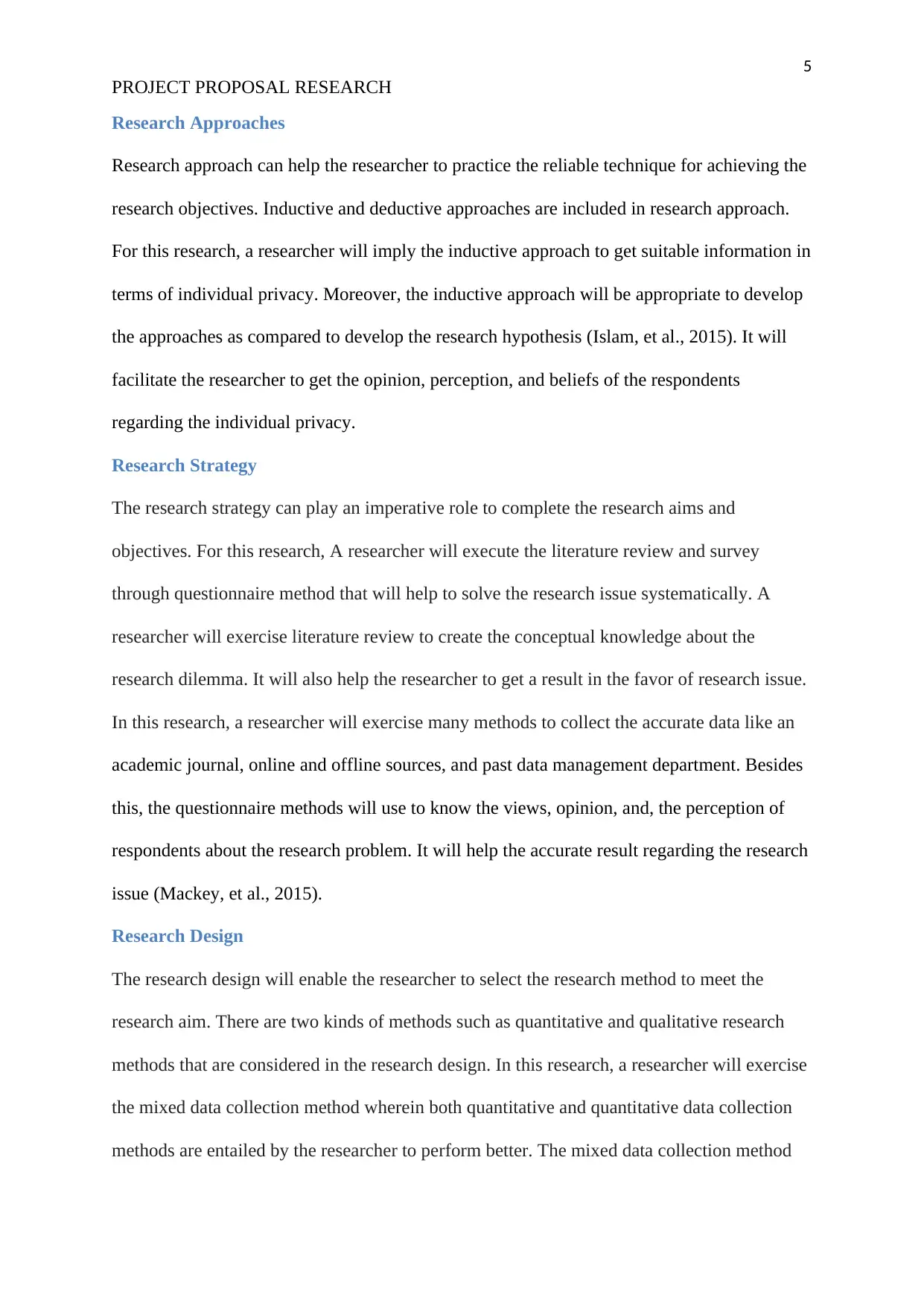
5
PROJECT PROPOSAL RESEARCH
Research Approaches
Research approach can help the researcher to practice the reliable technique for achieving the
research objectives. Inductive and deductive approaches are included in research approach.
For this research, a researcher will imply the inductive approach to get suitable information in
terms of individual privacy. Moreover, the inductive approach will be appropriate to develop
the approaches as compared to develop the research hypothesis (Islam, et al., 2015). It will
facilitate the researcher to get the opinion, perception, and beliefs of the respondents
regarding the individual privacy.
Research Strategy
The research strategy can play an imperative role to complete the research aims and
objectives. For this research, A researcher will execute the literature review and survey
through questionnaire method that will help to solve the research issue systematically. A
researcher will exercise literature review to create the conceptual knowledge about the
research dilemma. It will also help the researcher to get a result in the favor of research issue.
In this research, a researcher will exercise many methods to collect the accurate data like an
academic journal, online and offline sources, and past data management department. Besides
this, the questionnaire methods will use to know the views, opinion, and, the perception of
respondents about the research problem. It will help the accurate result regarding the research
issue (Mackey, et al., 2015).
Research Design
The research design will enable the researcher to select the research method to meet the
research aim. There are two kinds of methods such as quantitative and qualitative research
methods that are considered in the research design. In this research, a researcher will exercise
the mixed data collection method wherein both quantitative and quantitative data collection
methods are entailed by the researcher to perform better. The mixed data collection method
PROJECT PROPOSAL RESEARCH
Research Approaches
Research approach can help the researcher to practice the reliable technique for achieving the
research objectives. Inductive and deductive approaches are included in research approach.
For this research, a researcher will imply the inductive approach to get suitable information in
terms of individual privacy. Moreover, the inductive approach will be appropriate to develop
the approaches as compared to develop the research hypothesis (Islam, et al., 2015). It will
facilitate the researcher to get the opinion, perception, and beliefs of the respondents
regarding the individual privacy.
Research Strategy
The research strategy can play an imperative role to complete the research aims and
objectives. For this research, A researcher will execute the literature review and survey
through questionnaire method that will help to solve the research issue systematically. A
researcher will exercise literature review to create the conceptual knowledge about the
research dilemma. It will also help the researcher to get a result in the favor of research issue.
In this research, a researcher will exercise many methods to collect the accurate data like an
academic journal, online and offline sources, and past data management department. Besides
this, the questionnaire methods will use to know the views, opinion, and, the perception of
respondents about the research problem. It will help the accurate result regarding the research
issue (Mackey, et al., 2015).
Research Design
The research design will enable the researcher to select the research method to meet the
research aim. There are two kinds of methods such as quantitative and qualitative research
methods that are considered in the research design. In this research, a researcher will exercise
the mixed data collection method wherein both quantitative and quantitative data collection
methods are entailed by the researcher to perform better. The mixed data collection method
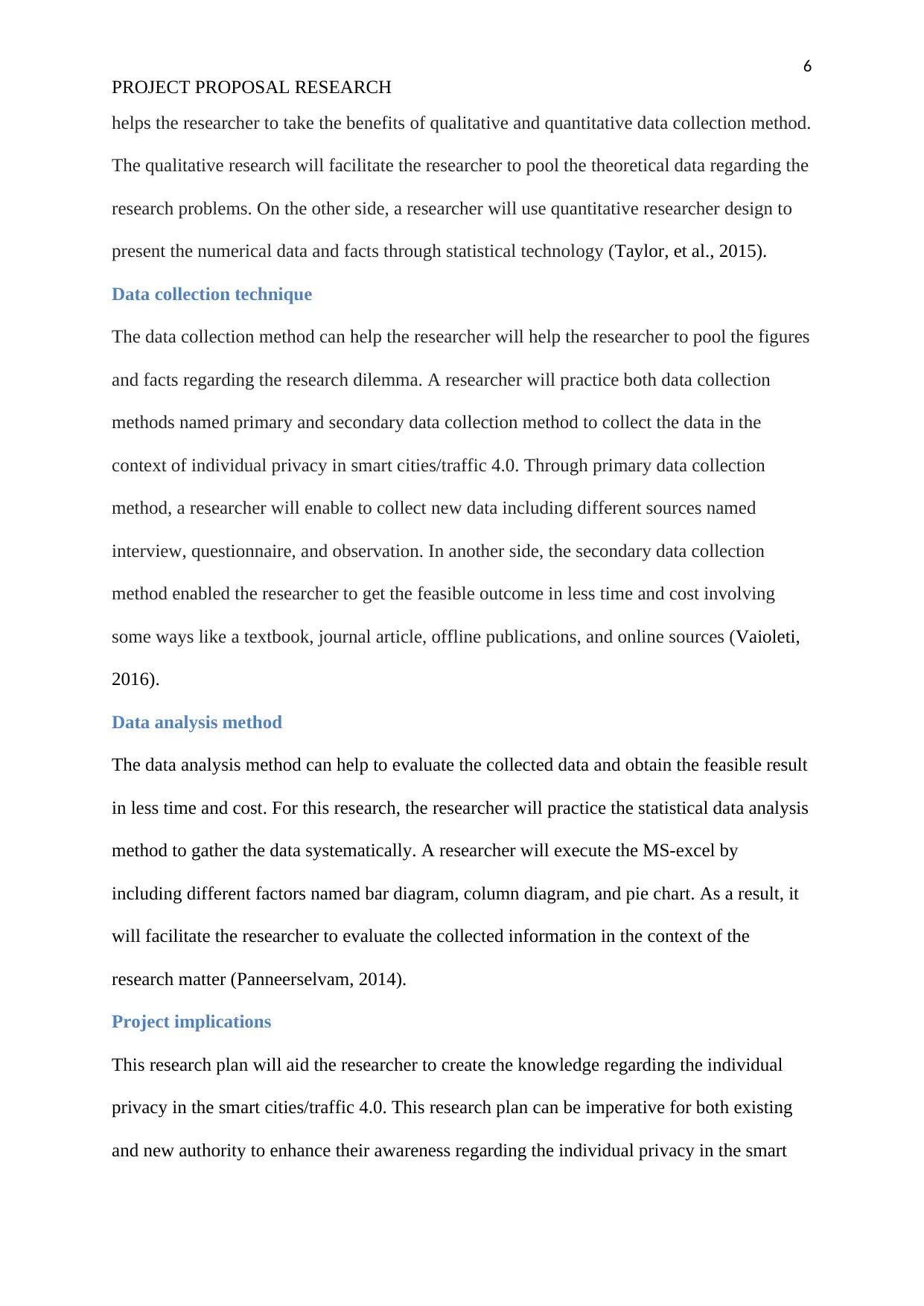
6
PROJECT PROPOSAL RESEARCH
helps the researcher to take the benefits of qualitative and quantitative data collection method.
The qualitative research will facilitate the researcher to pool the theoretical data regarding the
research problems. On the other side, a researcher will use quantitative researcher design to
present the numerical data and facts through statistical technology (Taylor, et al., 2015).
Data collection technique
The data collection method can help the researcher will help the researcher to pool the figures
and facts regarding the research dilemma. A researcher will practice both data collection
methods named primary and secondary data collection method to collect the data in the
context of individual privacy in smart cities/traffic 4.0. Through primary data collection
method, a researcher will enable to collect new data including different sources named
interview, questionnaire, and observation. In another side, the secondary data collection
method enabled the researcher to get the feasible outcome in less time and cost involving
some ways like a textbook, journal article, offline publications, and online sources (Vaioleti,
2016).
Data analysis method
The data analysis method can help to evaluate the collected data and obtain the feasible result
in less time and cost. For this research, the researcher will practice the statistical data analysis
method to gather the data systematically. A researcher will execute the MS-excel by
including different factors named bar diagram, column diagram, and pie chart. As a result, it
will facilitate the researcher to evaluate the collected information in the context of the
research matter (Panneerselvam, 2014).
Project implications
This research plan will aid the researcher to create the knowledge regarding the individual
privacy in the smart cities/traffic 4.0. This research plan can be imperative for both existing
and new authority to enhance their awareness regarding the individual privacy in the smart
PROJECT PROPOSAL RESEARCH
helps the researcher to take the benefits of qualitative and quantitative data collection method.
The qualitative research will facilitate the researcher to pool the theoretical data regarding the
research problems. On the other side, a researcher will use quantitative researcher design to
present the numerical data and facts through statistical technology (Taylor, et al., 2015).
Data collection technique
The data collection method can help the researcher will help the researcher to pool the figures
and facts regarding the research dilemma. A researcher will practice both data collection
methods named primary and secondary data collection method to collect the data in the
context of individual privacy in smart cities/traffic 4.0. Through primary data collection
method, a researcher will enable to collect new data including different sources named
interview, questionnaire, and observation. In another side, the secondary data collection
method enabled the researcher to get the feasible outcome in less time and cost involving
some ways like a textbook, journal article, offline publications, and online sources (Vaioleti,
2016).
Data analysis method
The data analysis method can help to evaluate the collected data and obtain the feasible result
in less time and cost. For this research, the researcher will practice the statistical data analysis
method to gather the data systematically. A researcher will execute the MS-excel by
including different factors named bar diagram, column diagram, and pie chart. As a result, it
will facilitate the researcher to evaluate the collected information in the context of the
research matter (Panneerselvam, 2014).
Project implications
This research plan will aid the researcher to create the knowledge regarding the individual
privacy in the smart cities/traffic 4.0. This research plan can be imperative for both existing
and new authority to enhance their awareness regarding the individual privacy in the smart
⊘ This is a preview!⊘
Do you want full access?
Subscribe today to unlock all pages.

Trusted by 1+ million students worldwide
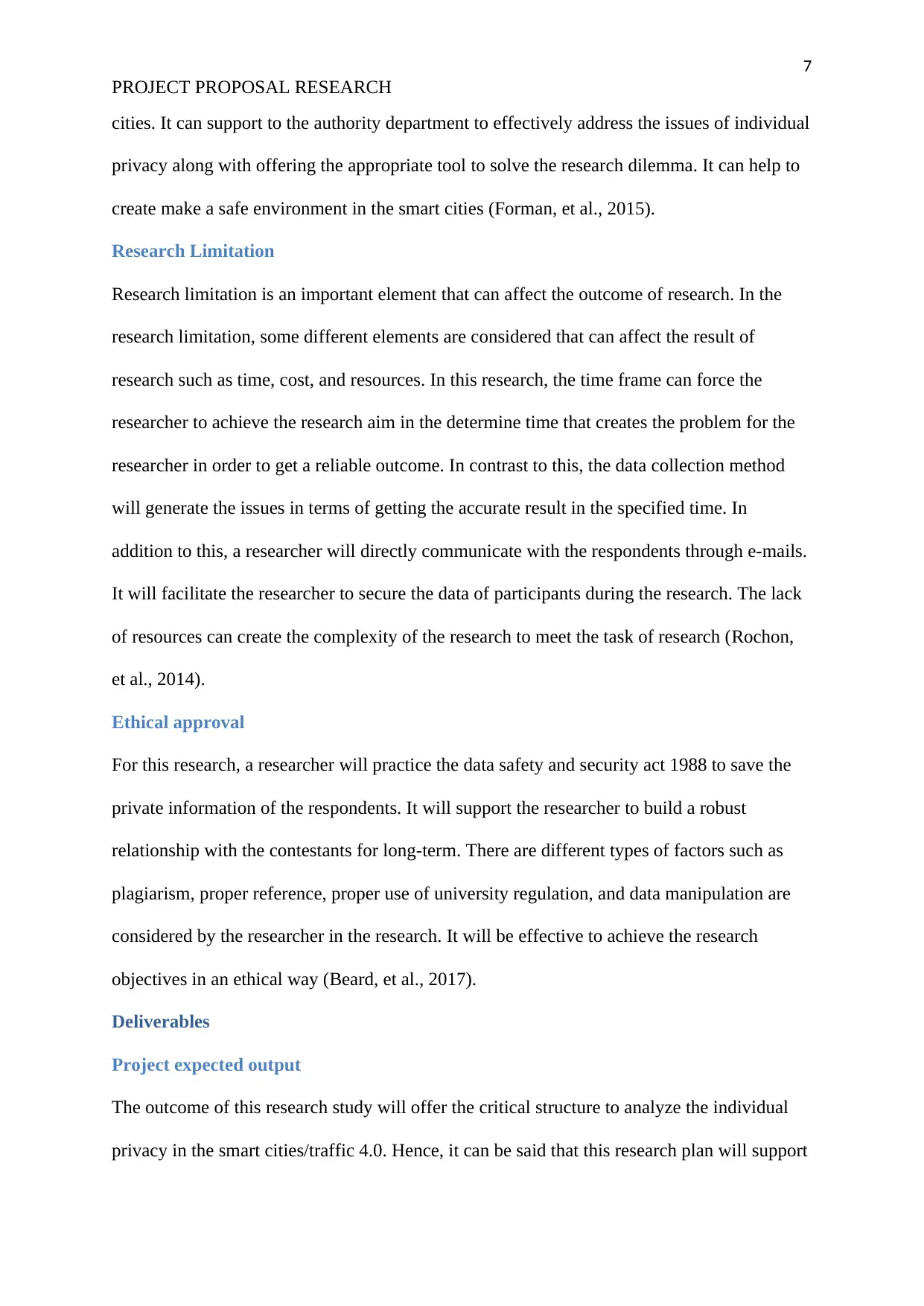
7
PROJECT PROPOSAL RESEARCH
cities. It can support to the authority department to effectively address the issues of individual
privacy along with offering the appropriate tool to solve the research dilemma. It can help to
create make a safe environment in the smart cities (Forman, et al., 2015).
Research Limitation
Research limitation is an important element that can affect the outcome of research. In the
research limitation, some different elements are considered that can affect the result of
research such as time, cost, and resources. In this research, the time frame can force the
researcher to achieve the research aim in the determine time that creates the problem for the
researcher in order to get a reliable outcome. In contrast to this, the data collection method
will generate the issues in terms of getting the accurate result in the specified time. In
addition to this, a researcher will directly communicate with the respondents through e-mails.
It will facilitate the researcher to secure the data of participants during the research. The lack
of resources can create the complexity of the research to meet the task of research (Rochon,
et al., 2014).
Ethical approval
For this research, a researcher will practice the data safety and security act 1988 to save the
private information of the respondents. It will support the researcher to build a robust
relationship with the contestants for long-term. There are different types of factors such as
plagiarism, proper reference, proper use of university regulation, and data manipulation are
considered by the researcher in the research. It will be effective to achieve the research
objectives in an ethical way (Beard, et al., 2017).
Deliverables
Project expected output
The outcome of this research study will offer the critical structure to analyze the individual
privacy in the smart cities/traffic 4.0. Hence, it can be said that this research plan will support
PROJECT PROPOSAL RESEARCH
cities. It can support to the authority department to effectively address the issues of individual
privacy along with offering the appropriate tool to solve the research dilemma. It can help to
create make a safe environment in the smart cities (Forman, et al., 2015).
Research Limitation
Research limitation is an important element that can affect the outcome of research. In the
research limitation, some different elements are considered that can affect the result of
research such as time, cost, and resources. In this research, the time frame can force the
researcher to achieve the research aim in the determine time that creates the problem for the
researcher in order to get a reliable outcome. In contrast to this, the data collection method
will generate the issues in terms of getting the accurate result in the specified time. In
addition to this, a researcher will directly communicate with the respondents through e-mails.
It will facilitate the researcher to secure the data of participants during the research. The lack
of resources can create the complexity of the research to meet the task of research (Rochon,
et al., 2014).
Ethical approval
For this research, a researcher will practice the data safety and security act 1988 to save the
private information of the respondents. It will support the researcher to build a robust
relationship with the contestants for long-term. There are different types of factors such as
plagiarism, proper reference, proper use of university regulation, and data manipulation are
considered by the researcher in the research. It will be effective to achieve the research
objectives in an ethical way (Beard, et al., 2017).
Deliverables
Project expected output
The outcome of this research study will offer the critical structure to analyze the individual
privacy in the smart cities/traffic 4.0. Hence, it can be said that this research plan will support
Paraphrase This Document
Need a fresh take? Get an instant paraphrase of this document with our AI Paraphraser
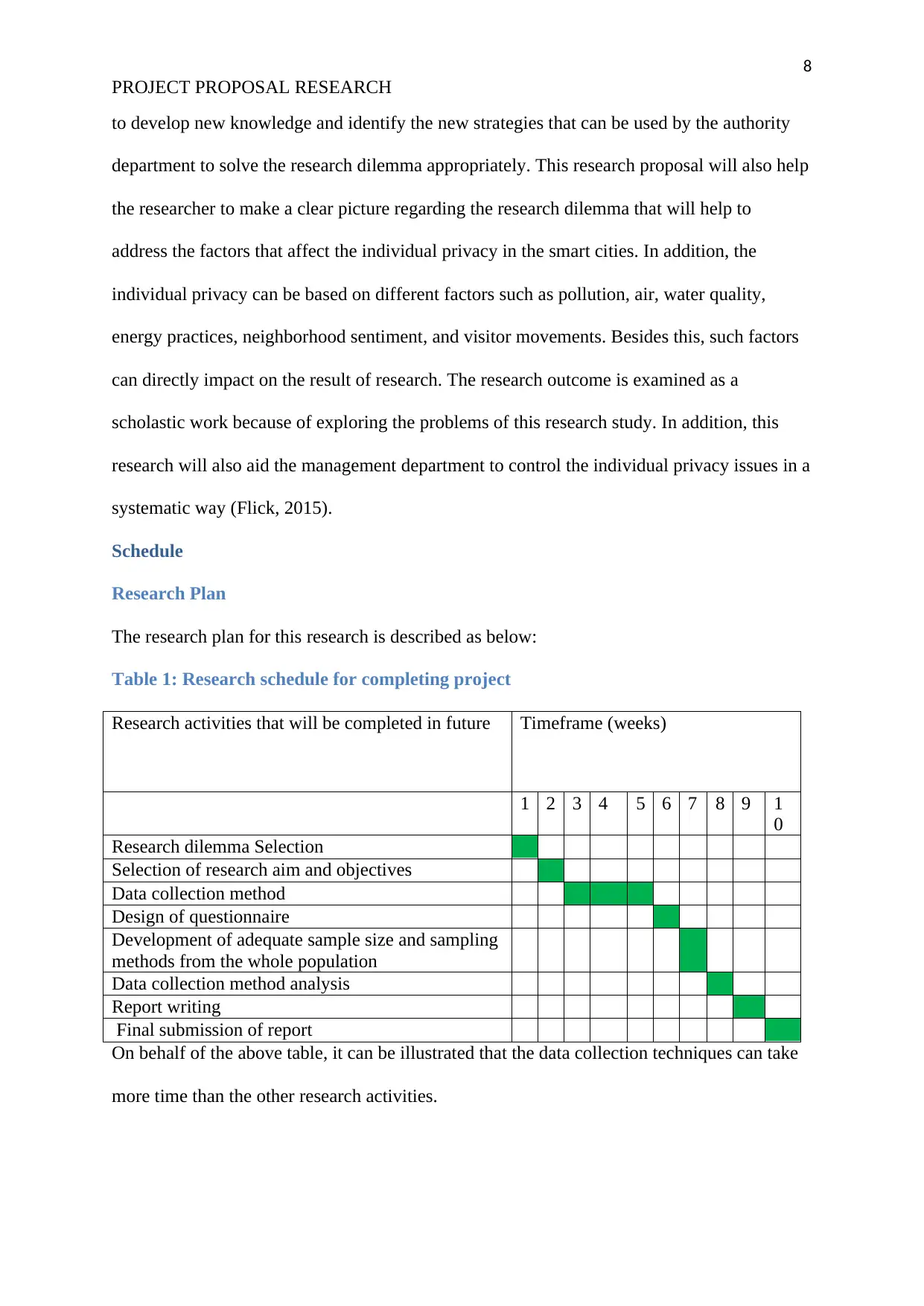
8
PROJECT PROPOSAL RESEARCH
to develop new knowledge and identify the new strategies that can be used by the authority
department to solve the research dilemma appropriately. This research proposal will also help
the researcher to make a clear picture regarding the research dilemma that will help to
address the factors that affect the individual privacy in the smart cities. In addition, the
individual privacy can be based on different factors such as pollution, air, water quality,
energy practices, neighborhood sentiment, and visitor movements. Besides this, such factors
can directly impact on the result of research. The research outcome is examined as a
scholastic work because of exploring the problems of this research study. In addition, this
research will also aid the management department to control the individual privacy issues in a
systematic way (Flick, 2015).
Schedule
Research Plan
The research plan for this research is described as below:
Table 1: Research schedule for completing project
Research activities that will be completed in future Timeframe (weeks)
1 2 3 4 5 6 7 8 9 1
0
Research dilemma Selection
Selection of research aim and objectives
Data collection method
Design of questionnaire
Development of adequate sample size and sampling
methods from the whole population
Data collection method analysis
Report writing
Final submission of report
On behalf of the above table, it can be illustrated that the data collection techniques can take
more time than the other research activities.
PROJECT PROPOSAL RESEARCH
to develop new knowledge and identify the new strategies that can be used by the authority
department to solve the research dilemma appropriately. This research proposal will also help
the researcher to make a clear picture regarding the research dilemma that will help to
address the factors that affect the individual privacy in the smart cities. In addition, the
individual privacy can be based on different factors such as pollution, air, water quality,
energy practices, neighborhood sentiment, and visitor movements. Besides this, such factors
can directly impact on the result of research. The research outcome is examined as a
scholastic work because of exploring the problems of this research study. In addition, this
research will also aid the management department to control the individual privacy issues in a
systematic way (Flick, 2015).
Schedule
Research Plan
The research plan for this research is described as below:
Table 1: Research schedule for completing project
Research activities that will be completed in future Timeframe (weeks)
1 2 3 4 5 6 7 8 9 1
0
Research dilemma Selection
Selection of research aim and objectives
Data collection method
Design of questionnaire
Development of adequate sample size and sampling
methods from the whole population
Data collection method analysis
Report writing
Final submission of report
On behalf of the above table, it can be illustrated that the data collection techniques can take
more time than the other research activities.
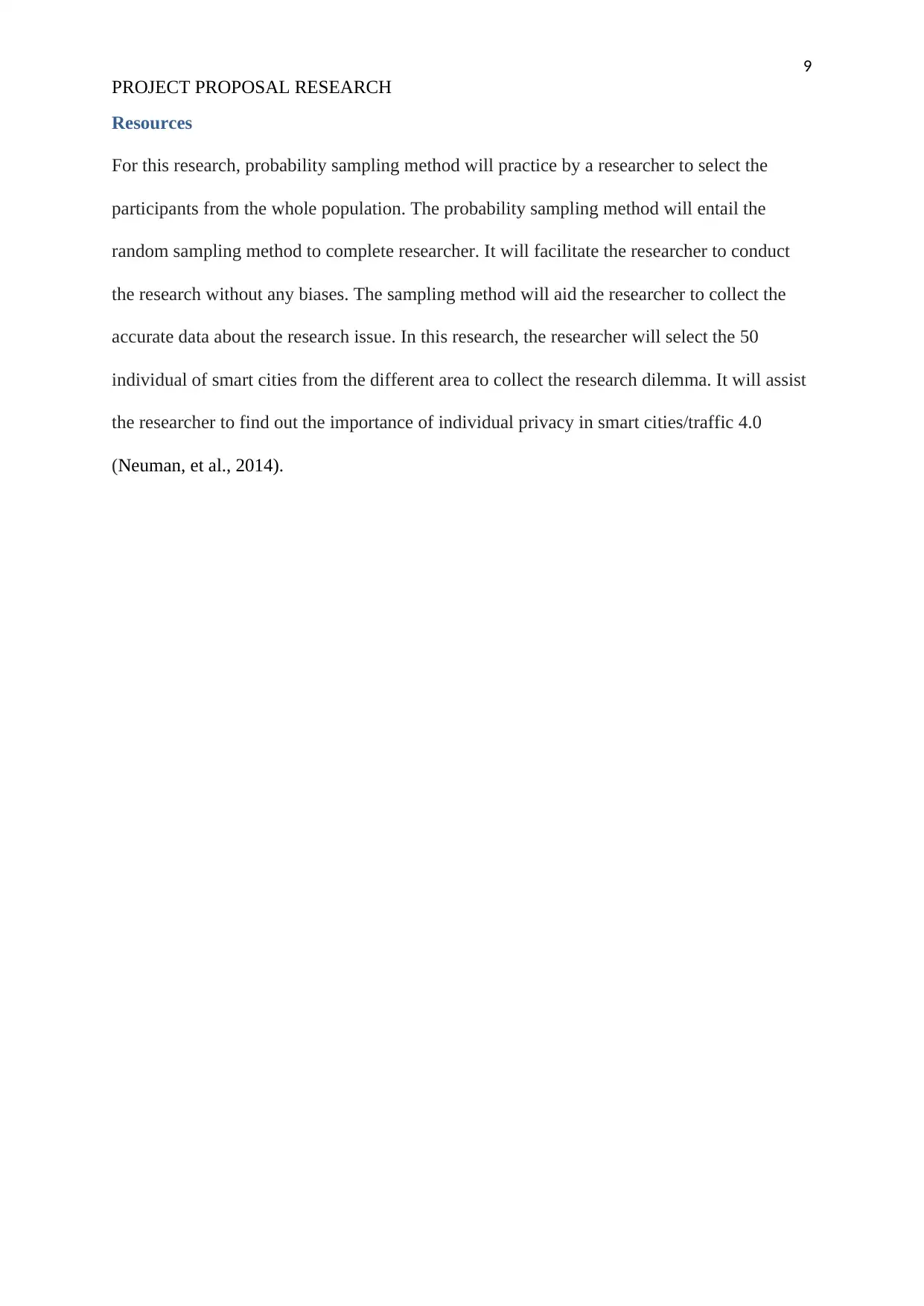
9
PROJECT PROPOSAL RESEARCH
Resources
For this research, probability sampling method will practice by a researcher to select the
participants from the whole population. The probability sampling method will entail the
random sampling method to complete researcher. It will facilitate the researcher to conduct
the research without any biases. The sampling method will aid the researcher to collect the
accurate data about the research issue. In this research, the researcher will select the 50
individual of smart cities from the different area to collect the research dilemma. It will assist
the researcher to find out the importance of individual privacy in smart cities/traffic 4.0
(Neuman, et al., 2014).
PROJECT PROPOSAL RESEARCH
Resources
For this research, probability sampling method will practice by a researcher to select the
participants from the whole population. The probability sampling method will entail the
random sampling method to complete researcher. It will facilitate the researcher to conduct
the research without any biases. The sampling method will aid the researcher to collect the
accurate data about the research issue. In this research, the researcher will select the 50
individual of smart cities from the different area to collect the research dilemma. It will assist
the researcher to find out the importance of individual privacy in smart cities/traffic 4.0
(Neuman, et al., 2014).
⊘ This is a preview!⊘
Do you want full access?
Subscribe today to unlock all pages.

Trusted by 1+ million students worldwide
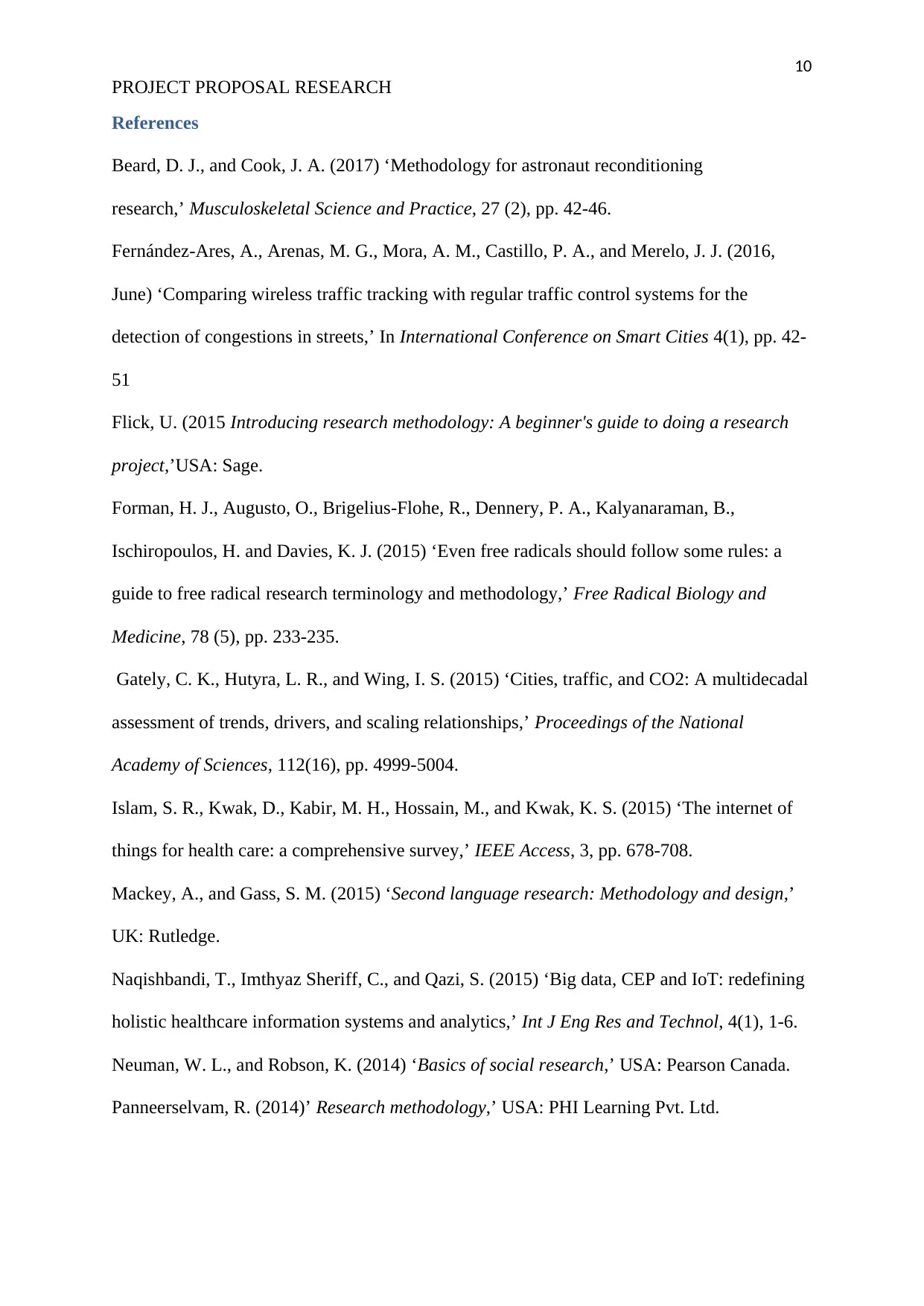
10
PROJECT PROPOSAL RESEARCH
References
Beard, D. J., and Cook, J. A. (2017) ‘Methodology for astronaut reconditioning
research,’ Musculoskeletal Science and Practice, 27 (2), pp. 42-46.
Fernández-Ares, A., Arenas, M. G., Mora, A. M., Castillo, P. A., and Merelo, J. J. (2016,
June) ‘Comparing wireless traffic tracking with regular traffic control systems for the
detection of congestions in streets,’ In International Conference on Smart Cities 4(1), pp. 42-
51
Flick, U. (2015 Introducing research methodology: A beginner's guide to doing a research
project,’USA: Sage.
Forman, H. J., Augusto, O., Brigelius-Flohe, R., Dennery, P. A., Kalyanaraman, B.,
Ischiropoulos, H. and Davies, K. J. (2015) ‘Even free radicals should follow some rules: a
guide to free radical research terminology and methodology,’ Free Radical Biology and
Medicine, 78 (5), pp. 233-235.
Gately, C. K., Hutyra, L. R., and Wing, I. S. (2015) ‘Cities, traffic, and CO2: A multidecadal
assessment of trends, drivers, and scaling relationships,’ Proceedings of the National
Academy of Sciences, 112(16), pp. 4999-5004.
Islam, S. R., Kwak, D., Kabir, M. H., Hossain, M., and Kwak, K. S. (2015) ‘The internet of
things for health care: a comprehensive survey,’ IEEE Access, 3, pp. 678-708.
Mackey, A., and Gass, S. M. (2015) ‘Second language research: Methodology and design,’
UK: Rutledge.
Naqishbandi, T., Imthyaz Sheriff, C., and Qazi, S. (2015) ‘Big data, CEP and IoT: redefining
holistic healthcare information systems and analytics,’ Int J Eng Res and Technol, 4(1), 1-6.
Neuman, W. L., and Robson, K. (2014) ‘Basics of social research,’ USA: Pearson Canada.
Panneerselvam, R. (2014)’ Research methodology,’ USA: PHI Learning Pvt. Ltd.
PROJECT PROPOSAL RESEARCH
References
Beard, D. J., and Cook, J. A. (2017) ‘Methodology for astronaut reconditioning
research,’ Musculoskeletal Science and Practice, 27 (2), pp. 42-46.
Fernández-Ares, A., Arenas, M. G., Mora, A. M., Castillo, P. A., and Merelo, J. J. (2016,
June) ‘Comparing wireless traffic tracking with regular traffic control systems for the
detection of congestions in streets,’ In International Conference on Smart Cities 4(1), pp. 42-
51
Flick, U. (2015 Introducing research methodology: A beginner's guide to doing a research
project,’USA: Sage.
Forman, H. J., Augusto, O., Brigelius-Flohe, R., Dennery, P. A., Kalyanaraman, B.,
Ischiropoulos, H. and Davies, K. J. (2015) ‘Even free radicals should follow some rules: a
guide to free radical research terminology and methodology,’ Free Radical Biology and
Medicine, 78 (5), pp. 233-235.
Gately, C. K., Hutyra, L. R., and Wing, I. S. (2015) ‘Cities, traffic, and CO2: A multidecadal
assessment of trends, drivers, and scaling relationships,’ Proceedings of the National
Academy of Sciences, 112(16), pp. 4999-5004.
Islam, S. R., Kwak, D., Kabir, M. H., Hossain, M., and Kwak, K. S. (2015) ‘The internet of
things for health care: a comprehensive survey,’ IEEE Access, 3, pp. 678-708.
Mackey, A., and Gass, S. M. (2015) ‘Second language research: Methodology and design,’
UK: Rutledge.
Naqishbandi, T., Imthyaz Sheriff, C., and Qazi, S. (2015) ‘Big data, CEP and IoT: redefining
holistic healthcare information systems and analytics,’ Int J Eng Res and Technol, 4(1), 1-6.
Neuman, W. L., and Robson, K. (2014) ‘Basics of social research,’ USA: Pearson Canada.
Panneerselvam, R. (2014)’ Research methodology,’ USA: PHI Learning Pvt. Ltd.
Paraphrase This Document
Need a fresh take? Get an instant paraphrase of this document with our AI Paraphraser
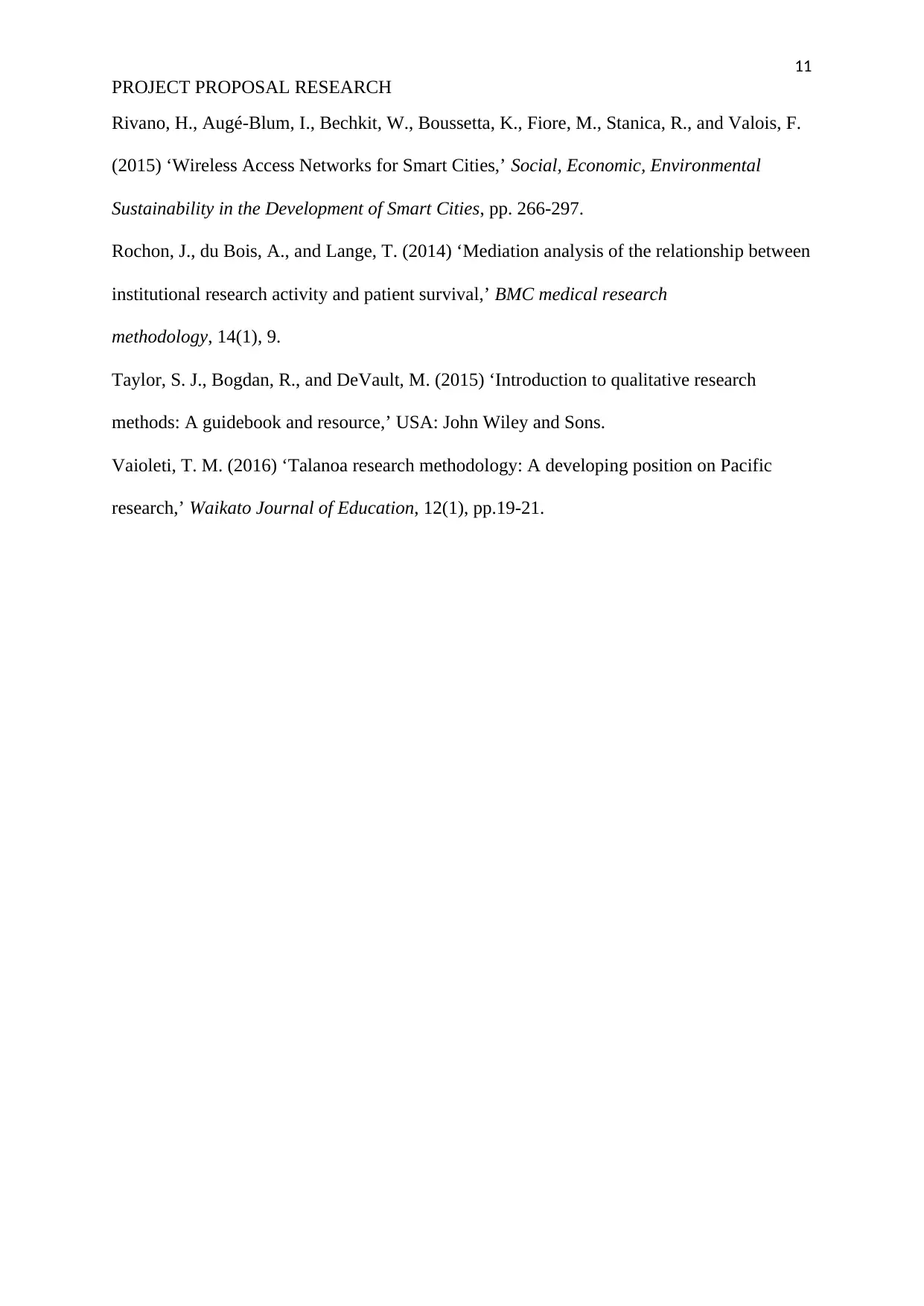
11
PROJECT PROPOSAL RESEARCH
Rivano, H., Augé-Blum, I., Bechkit, W., Boussetta, K., Fiore, M., Stanica, R., and Valois, F.
(2015) ‘Wireless Access Networks for Smart Cities,’ Social, Economic, Environmental
Sustainability in the Development of Smart Cities, pp. 266-297.
Rochon, J., du Bois, A., and Lange, T. (2014) ‘Mediation analysis of the relationship between
institutional research activity and patient survival,’ BMC medical research
methodology, 14(1), 9.
Taylor, S. J., Bogdan, R., and DeVault, M. (2015) ‘Introduction to qualitative research
methods: A guidebook and resource,’ USA: John Wiley and Sons.
Vaioleti, T. M. (2016) ‘Talanoa research methodology: A developing position on Pacific
research,’ Waikato Journal of Education, 12(1), pp.19-21.
PROJECT PROPOSAL RESEARCH
Rivano, H., Augé-Blum, I., Bechkit, W., Boussetta, K., Fiore, M., Stanica, R., and Valois, F.
(2015) ‘Wireless Access Networks for Smart Cities,’ Social, Economic, Environmental
Sustainability in the Development of Smart Cities, pp. 266-297.
Rochon, J., du Bois, A., and Lange, T. (2014) ‘Mediation analysis of the relationship between
institutional research activity and patient survival,’ BMC medical research
methodology, 14(1), 9.
Taylor, S. J., Bogdan, R., and DeVault, M. (2015) ‘Introduction to qualitative research
methods: A guidebook and resource,’ USA: John Wiley and Sons.
Vaioleti, T. M. (2016) ‘Talanoa research methodology: A developing position on Pacific
research,’ Waikato Journal of Education, 12(1), pp.19-21.
1 out of 11
Related Documents
Your All-in-One AI-Powered Toolkit for Academic Success.
+13062052269
info@desklib.com
Available 24*7 on WhatsApp / Email
![[object Object]](/_next/static/media/star-bottom.7253800d.svg)
Unlock your academic potential
Copyright © 2020–2026 A2Z Services. All Rights Reserved. Developed and managed by ZUCOL.





